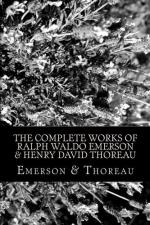|
This section contains 12,574 words (approx. 42 pages at 300 words per page) |

|
SOURCE: The Poetry of Henry David Thoreau, Transcendtal Books, 1970, pp. 4-24.
In the following essay, Ford offers an analysis of the themes, imagery, and structure of the poems.
I. Theme
The ultimate experience for Thoreau was a complete destruction of the division between himself and that outside himself, a unification—or reunification—of all elements of existence. Whereas Emerson talked of a soul reaching out and becoming one with the non-physical Oversoul, Thoreau described a more tangible oneness with physical nature. Emerson used nature as a vehicle to the Ideal; Thoreau, the sensualist, acknowledged this use but became too intimate with nature to leave the body for the soul. Thoreau's ultimate experience then is for the body to be taken literally into the trees, the sounds of the birds, the streams, and the ponds. Although recognizing the physical impossibility of such an act, Thoreau insisted that through this...
|
This section contains 12,574 words (approx. 42 pages at 300 words per page) |

|


